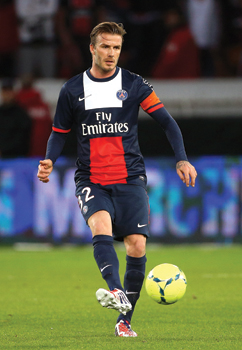When David Beckham announced his retirement, I looked at my watch. It wasn’t to record the time of sports marketing’s latest JFK moment; I was just trying to squeeze in lunch before someone rang to ask me the Brand Beckham Question (BBQ).
You’ll be familiar with the BBQ. It comes in many guises, but in essence is the same the world over. Whenever “something happens,” from Mo Farah winning double gold to Tiger Woods hitting a fire hydrant, the BBQ and its many variants are never far behind.
In essence, when boiled down, the BBQ is very simple: What’s he worth?
That’s pretty much it. Can you put a dollar figure on a star’s reputation?
There are three basic rules to follow when responding.
1. The number must be divisible by 10. As in “Rory McIlroy is going to be worth $40 million next year.” If your answer is $37.4 million, you better have some facts to back it up.
2. There is no right or wrong answer. Newspapers (and the websites that copy them) report business in the same way they report sports: The BBQ is just a way of keeping score.
3. The number must reflect the direction of travel. For example:
• Tiger + Fire Hydrant = -$80 million.
• Rory + U.S. Open = +$20 million
In this vein, my answer to the BBQ is $56.46 million*. This puts him in the spread that ran in the days following his retirement, when the brand value of football’s greatest-ever pitchman fell between $40 million to $100 million, depending on your choice of media outlet.
Who knows? Who cares?
But there’s something else lurking in the BBQ that is worth pursuing.
A list of the most successful brand ambassadors of the past 10 years might include Tiger Woods, Beckham and Kate Moss. Each has a global reach, and each is at his or her best when seen and not heard.
The best description of this process of projection came from Rob Walker, who wrote the “Consumed” column in The New York Times. Walker cites the success of the Hello Kitty dolls, a global sales phenomenon, to illustrate what makes the perfect brand ambassador.
Hello Kitty’s face has no mouth and so has no expression. She comes with no story of her own, only that projected on to her by her fans. She stands for nothing, and when you stand for nothing, you can stand for anything.
Brands love Beckham because he has a seemingly unlimited capacity to carry brand messages, be they from Adidas, MLS, Pepsi or the Chinese Football Association, for whom he became an ambassador earlier this year. He is the archetype “vanilla” athlete, to use former NBA player John Amaechi’s phrase, and has come to define the relationship between fame and sport.
 |
David Beckham is a popular spokesman for sports and entertainment brands.
Photo by: GETTY IMAGES
|
It makes business sense, Amaechi told me: “If you have strong convictions about child poverty, the question of where your shoes are made instantly becomes a factor.”
I should make it clear, I don’t have a problem with David Beckham the person. He seems a genuinely decent bloke who does a great deal of charity work and is committed to building his foundation. It’s his legacy that concerns me. He has become the MBA case study of sports celebrity, pored over by wannabe PR reps and agents. The received wisdom from the Beckham era is that the corporate money goes to the bland ambassador, the spokesman who dares not speak.
This is such a waste of fame.
In the same week that Beckham retired, Angelina Jolie showed how powerful celebrity can be. She wasn’t hawking product or flogging endorsements. Jolie wrote a deeply personal essay in The New York Times on the reasons for choosing to undergo
a voluntary double mastectomy.
“I chose not to keep my story private because there are many women who do not know that they might be living under the shadow of cancer,” she wrote. “It is my hope that they, too, will be able to get gene tested, and that if they have a high risk they, too, will know they have strong options.”
If you have any doubt about how big a risk it is for a famous actress to draw attention to her breasts, go rewind this year’s Oscar ceremony to the bit when host Seth MacFarlane sang “We Saw Your Boobs,” thus reducing some of the greatest acting talent in Hollywood to a body part.
Jolie has refused to play the game. This is what celebrity can do: It can change the way we see the world.
By comparison, sports’ famous people — with some notable exceptions — stand for consumerism. They use their fame to flog us with stuff.
The Los Angeles Times carried a poignant reminder of what happens to even the greatest athlete brands. “By the time Joe DiMaggio had become a stooped, gray-haired man, more people knew him as Mr. Coffee, spokesman for a home coffeemaker, than as the Yankee Clipper, one of the most graceful center fielders in baseball history.”
That might be one of saddest sentences I’ve ever read.
*I don’t know the answer to the BBQ.
Richard Gillis writes for The Wall Street Journal in London and his Unofficial Partner blog. Follow him on Twitter @RichardGillis1.





